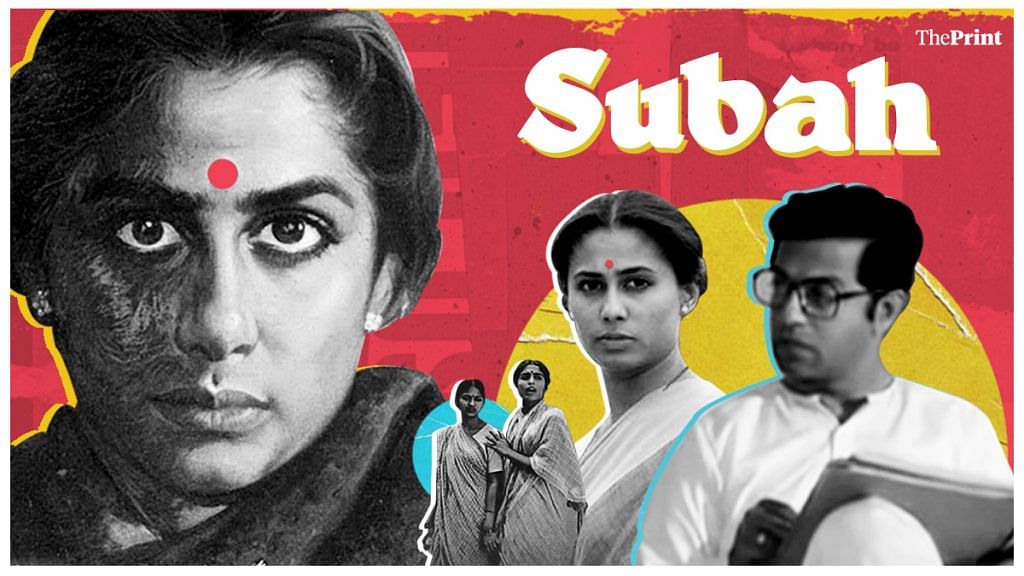There is a scene in Smita Patil starrer Subah — Savitri, played by Patil, is sitting with her family and her lawyer husband is discussing how he is trying to save his client accused of rape. “Bas aurat ko badchalan saabit kar do (just prove the woman is characterless),” he laughs. The women of the family, including Savitri’s mother-in-law, who is a social worker, do not object. But for Savitri, the discussion is too uncomfortable, she immediately leaves the room.
In another scene, when Savitri receives an offer letter for her dream job at one of the women’s ‘reformatory ashram’, her husband is reluctant to let her go initially. But ultimately convinces himself, being ‘supportive’ of his wife’s dreams. “Log bewakoof kahenge, par main bewakoof kahlana sahan kar sakta hoon, lekin beraham nahin” (I can accept being called stupid, but not merciless)”.
When we talk about misogyny and ill-treatment meted out to women, our imagination often limits such discrimination to middle-class and lower middle-class families. We are convinced that these ills do not exist beyond the lower strata of society. And popular culture, especially films, play a big role in perpetuating such stereotypes. But Subah busts these myths.
The film shows a well-educated family that has a reputation. They talk about ‘giving freedom’ to women of their house but, in reality, are deeply sexist. Subah is a story of a woman trying to power through this societal and familial discrimination to fulfill her dreams while remaining part of one such family.
On Smita Patil’s birthday, ThePrint revisits Subah (1982) — a film she referred to as her personal favourite.
Also read: In trying to save the world, James Bond just saved the franchise
The conflict within
Subah opens with Savitri sitting in her garden, staring in oblivion. She has a seemingly good family — a mother-in-law who indulges in social work, a husband (Subhash, played by Girish Karnad) who is a reputed lawyer, and a daughter, Rani, whom she loves dearly. But Savitri, right from the beginning of the film, carries a face that conveys a feeling of ‘being lost’. She is a gold-medalist in social work from Tata Institute of Social Sciences, Mumbai. Despite all that she has, she is struggling to find her place in her sasural, often subjected to comments from her husband and mother-in-law about why she cannot be a bit more cheerful.
One day, she receives a job offer from an ‘ashram’ for the post of superintendent. Savitri is passionate towards the cause of estranged women, who have been rejected by their families and society, and thus feels it is a perfect opportunity for her. But she faces rejection from her husband and mother-in-law on the idea of taking up this opportunity. Later, Subhash reluctantly agrees but on the condition that their daughter will not accompany Savitri when she moves out of town.
But Savitri’s mother-in-law is a character more orthodox. “Bhale ghar ki bahu social work ki wajah se ghar chhod kar jaati hai kabhi? (Does a respected family’s daughter-in-law leave home because of social work?),” says a woman who herself is a social worker!
Convincing the family is just one of the many battles Savitri has to face as new challenges await her at her workplace. A nexus of politicians, ashram administration and inmates is involved in the trafficking of resident girls. After a brief struggle in her professional world, where she was forced to give up her position, Savitri returns home only to learn about her husband’s extra marital affair with another woman.
Here is a woman, who is capable, intelligent and ambitious, but often finds herself caught up in the complications of a family life.
Also read: Apple TV show ‘Ted Lasso’ passed its greatest test — winning over football fanatics
Treading a difficult path
On screen, an ambitious woman is often portrayed as someone devoid of motherly instincts, and one who doesn’t care about family. That’s where Smita Patil’s character breaks the glass ceiling — Savitri loves her family but is equally passionate about her work. There is a difficult thin line she is trying to walk on, giving the message that a woman can be both, compassionate yet fierce, caring yet independent, and loving yet ambitious.
The film’s subtheme explores corruption and mismanagement of shelter homes, something that is still relevant. It also touches upon homosexuality, showing two shelter home inmates in love. On Subah being cleared by the Censor Board, director Jabbar Patel had said in an interview: “I think the trick is that we depicted this relationship as we would any other. We just showed two women in love, at a time when homosexuality was never even spoken about as it is now.”
Subah saves the best for the last. The film has a poetic ending and leaves the audience with undefined answers.
In this scene, Savitri is still overcoming the fact that her husband cheated on her while she was away, trying to find her feet in the world outside, working for women’s welfare. Her daughter, Rani, is seen reciting a poem:
“Let me fly, says little birdie, Mother, let me fly away.
Birdie, rest a little longer Till [thy] little wings are stronger,
So she rests a little longer Then she flies away”
This has given Savitri the answers to her questions, as she too, flies away from the toxic relationship.
(Edited by Anurag Chaubey)
